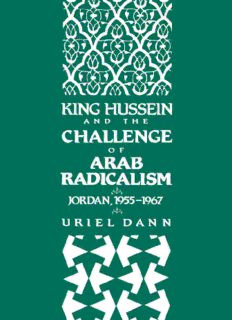
King Hussein and the Challenge of Arab Radicalism: Jordan, 1955-1967 (Studies in Middle Eastern History) PDF
Preview King Hussein and the Challenge of Arab Radicalism: Jordan, 1955-1967 (Studies in Middle Eastern History)
KING HUSSEIN AND THE CHALLENGE OF ARAB RADICALISM STUDIES IN MIDDLE EASTERN HISTORY Bernard Lewis, Itamar Rabinovich, and Roger Savory, GENERAL EDITORS THE TURBAN FOR THE CROWN The Islamic Revolution in Iran Said Amir Arjomand LANGUAGE AND CHANGE IN THE ARAB MIDDLE EAST The Evolution of Modern Arabic Political Discourse Ami Ayalon ISLAMIC REFORM Politics and Social Change in Late Ottoman Syria David Dean Commins KING HUSSEIN AND THE CHALLENGE OF ARAB RADICALISM Jordan, 1955-1967 Uriel Dann EGYPT, ISLAM, AND THE ARABS The Search for Egyptian Nationhood, 1900-1930 Israel Gershoni and James Jankowski EAST ENCOUNTERS WEST France and the Ottoman Empire in the Eighteenth Century Fatma Miige Gocek THE FERTILE CRESCENT, 1800-1914 A Documentary Economic History Edited by Charles Issawi ESTRANGED BEDFELLOWS Britain and France in the Middle East during the Second World War Aviel Roshwald OTHER VOLUMES ARE IN PREPARATION KING HUSSEIN AND THE CHALLENGE OF ARAB RADICALISM Jordan, 1955-1967 URIEL DANN In cooperation with THE MOSHE DAY AN CENTER FOR MIDDLE EASTERN AND AFRICAN STUDIES Tel Aviv University OXFORD UNIVERSITY PRESS New York Oxford Oxford University Press Oxford New York Toronto Delhi Bombay Calcutta Madras Karachi Petaling Jaya Singapore Hong Kong Tokyo Nairobi Dar es Salaam Cape Town Melbourne Auckland and associated companies in Berlin I bad an Copyright © 1989 by Oxford University Press, Inc. First published in 1989 by Oxford University Press, Inc., 200 Madison Avenue, New York, New York 10016 First Issued as an Oxford University Press paperback, 1991 Oxford is a registered trademark of Oxford University Press All rights reserved. No part of this publication may be reproduced, stored in a retrieval system, or transmitted, in any form or by any means, electornic, mechanical, photocopying, recording, or otherwise, without the prior permission of Oxford University Press. Library of Congress Cataloging-in-Publication Data Dann, Uriel, 1922- King Hussein and the challenge of Arab radicalism : Jordan 1955-1967 / Uriel Dann. p. cm.—(Studies in Middle Eastern history) Includes index. ISBN 0-19-505498-9 ISBN 0-19-507134-4 (pbk) I. Jordan—Politics and government. 2. Jordan—Foreign relations— Arab countries. 3. Arab countries—Foreign relations—Jordan. 4. Hussein, King of Jordan, 1935- . I. Title. II. Series: Studies in Middle Eastern history (New York, N.Y.) DS154.55.D35 1989 956.95'043—dc!9 88-29104 1 3 5 7 9 8 6 42 Printed in the United States of America on acid-free paper In memory of Zeev Bar-Lavie, "Biber," 1927-1985 This page intentionally left blank However much one may admire the courage of this lonely young king, it is difficult to avoid the conclusion his days are numbered. Anthony Nutting, former British minister of state for foreign affairs, New York Herald Tribune, 31 July 1958 This page intentionally left blank Preface The epigraph has proved to be wrong. I myself pronounced King Hus- sein's days "numbered" before Sir Anthony Nutting did; today—perhaps wiser than I was thirty years ago and certainly under no pressure to pon- tificate—I predict nothing. Yet 1 cannot say that my earlier evaluation was founded in ignorance, and certainly not in wishful thinking. There were valid reasons for discounting the odds on Hussein and on the polity for which he stood. Since this book is not an occasion for self-justification, the best I can do is exchange the role of forecaster for that of historian and find out how Hussein survived, and why. I have assumed as little as possible. It is true that the foundations of Hussein's rule were charged with problems. It is also true that between 1955 and 1967, Hussein faced a challenge and an onslaught from Arab radicalism personified by Gamal Abdel Nas- ser and those who followed his lead, although challenge and onslaught intensified or receded with the circumstances, dramatically diminishing after the Six-Day War. I had to assume one constant—that Hussein was determined to stay the course, although fluctuating moods are discernible. Among my sources, first place goes to primary materials—official pub- lications, newspapers, periodicals, broadcast monitorings, pamphlets— which have again proved to me that they may serve as mines of under- standing, not merely of information. Secondary sources are multiplying, and I have used them as best I could. I have utilized originally classified material as it became available; the liberal practice of declassification that prevails in the United States carries the researcher far closer to the present day than the thirty-year rule would allow. Interviews have given me some confidence that I was on paths that led somewhere. It is difficult to apportion acknowledgments for a work that has been
Description: